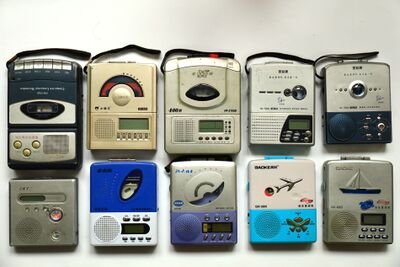User:)biyibiyibiyi(/grad project: Difference between revisions
| (60 intermediate revisions by 2 users not shown) | |||
| Line 1: | Line 1: | ||
[[File:Tableau_repeater.jpg|400px]] | |||
<br> | |||
source:http://xinhua-rss.zhongguowangshi.com/232/1377701763410936189/5117654.html | |||
[[/archive | The archive]] | |||
== Repeater | fù dú jī | 复读机 | Archive == | == Repeater | fù dú jī | 复读机 | Archive == | ||
===Introduction=== | |||
The archive surrounds the narrative of the repeater, a device used in China since the 90s, predominantly for learning English. It was invented by a telecommunications engineer in his forties to learn English, since folks at his age learned Russian in school. The device quickly became phenomenal, and radically changed how language learning is perceived and conducted. | The archive surrounds the narrative of the repeater, a device used in China since the 90s, predominantly for learning English. It was invented by a telecommunications engineer in his forties to learn English, since folks at his age learned Russian in school. The device quickly became phenomenal, and radically changed how language learning is perceived and conducted. | ||
| Line 7: | Line 15: | ||
Several methods and schools of thought inform my project - the method of the anarchive, the field of media archaeology, and the study of sound. Today, the repeater, along with the pedagogy the device proposed, has gradually exited from the landscape of language learning. It is an object of media archaeological value. Talking to my friends from childhood, I collected interviews that will work as contextual narratives, on how the device took place in everyday living. | Several methods and schools of thought inform my project - the method of the anarchive, the field of media archaeology, and the study of sound. Today, the repeater, along with the pedagogy the device proposed, has gradually exited from the landscape of language learning. It is an object of media archaeological value. Talking to my friends from childhood, I collected interviews that will work as contextual narratives, on how the device took place in everyday living. | ||
== | == Starting out: Collecting spoken interviews == | ||
Intentionally, I want to approach the archive from a departure of intimacy. To start out to work comfortably with voice and speech, I conducted only two interviews. One from my childhood friend, and another with a girl I encountered purely by accident. | |||
Intentionally, I want to approach the archive from a departure of intimacy. | |||
=== [[User:)biyibiyibiyi(/grad_project/wangzhen|w Childhood friend Wang Zhen ]]=== | |||
=== [[User:)biyibiyibiyi(/grad_project/xuanxuan|w encountered high school seller Xuan Xuan]]=== | |||
== [[User:)biyibiyibiyi(/grad project/sound_archive | working with sound]] == | |||
[[/ disney tunes | disney tunes ]] | |||
== | == [[User:)biyibiyibiyi(/grad project/narrative_video_archive | Narrative video archive]] == | ||
[[/radio calisthenics series/Costume |Costume]] | |||
[[/radio calisthenics series |calisthenic series]] | |||
[[/repeater_narration |repeater narration]] | |||
== [[User:)biyibiyibiyi(/grad_project/User:)biyibiyibiyi(/grad_project/stickers|Stickers archive ]]== | |||
Latest revision as of 09:25, 20 May 2020

source:http://xinhua-rss.zhongguowangshi.com/232/1377701763410936189/5117654.html
Repeater | fù dú jī | 复读机 | Archive
Introduction
The archive surrounds the narrative of the repeater, a device used in China since the 90s, predominantly for learning English. It was invented by a telecommunications engineer in his forties to learn English, since folks at his age learned Russian in school. The device quickly became phenomenal, and radically changed how language learning is perceived and conducted.
This device commenced and accompanied the my English learning career. It is a tool of disembodiment. Students were tortured and frustrated from repeating from tape recordings out of everyday context; at the same time the device was a tool for advancement and mobility during the country's then radically transformative years.
Several methods and schools of thought inform my project - the method of the anarchive, the field of media archaeology, and the study of sound. Today, the repeater, along with the pedagogy the device proposed, has gradually exited from the landscape of language learning. It is an object of media archaeological value. Talking to my friends from childhood, I collected interviews that will work as contextual narratives, on how the device took place in everyday living.
Starting out: Collecting spoken interviews
Intentionally, I want to approach the archive from a departure of intimacy. To start out to work comfortably with voice and speech, I conducted only two interviews. One from my childhood friend, and another with a girl I encountered purely by accident.
